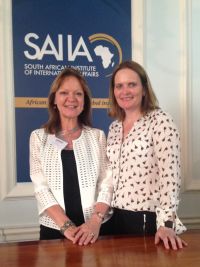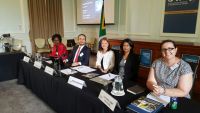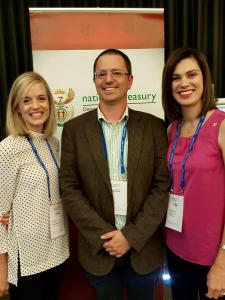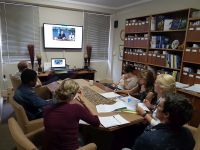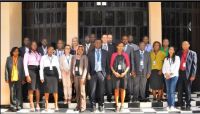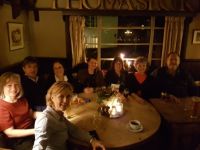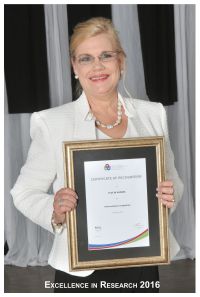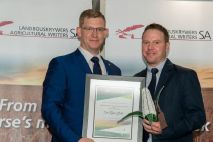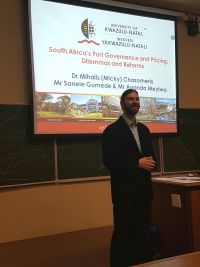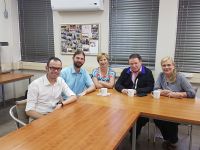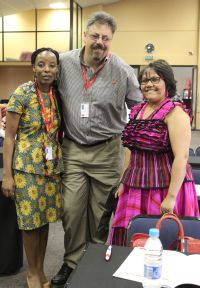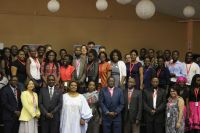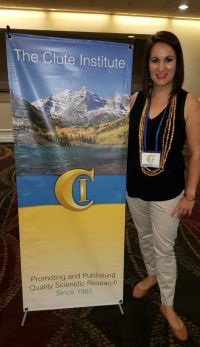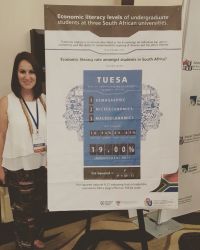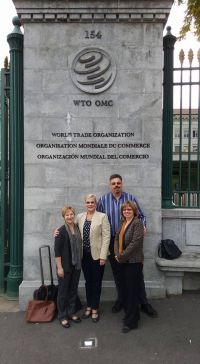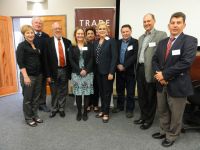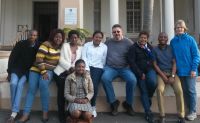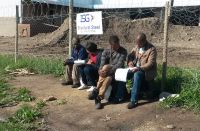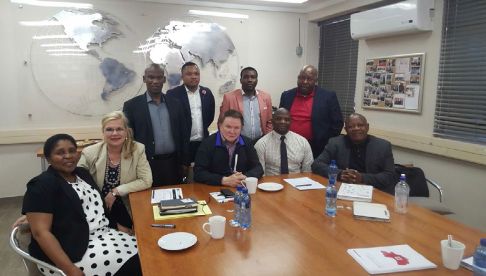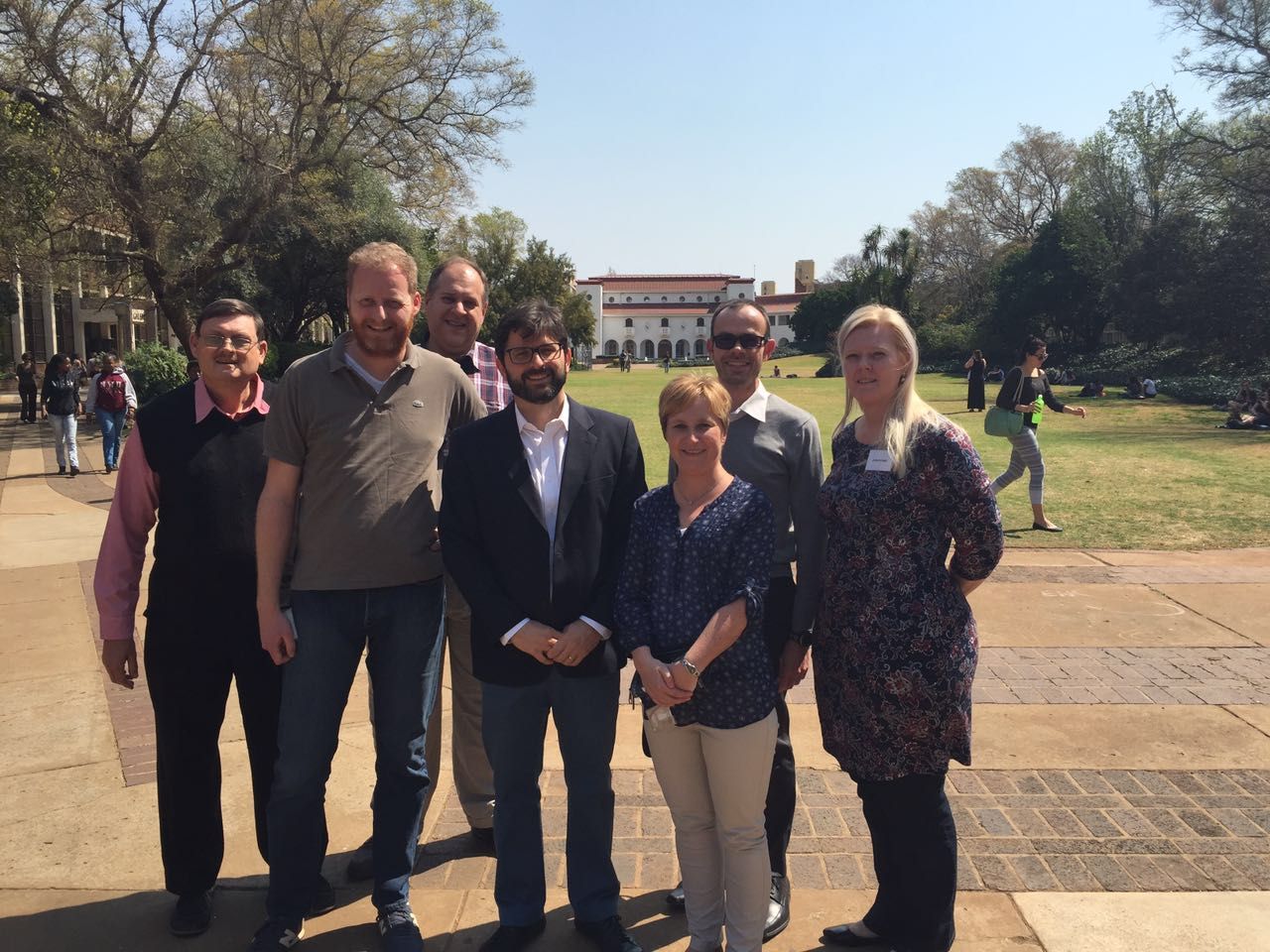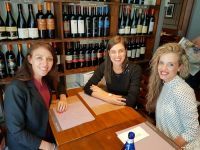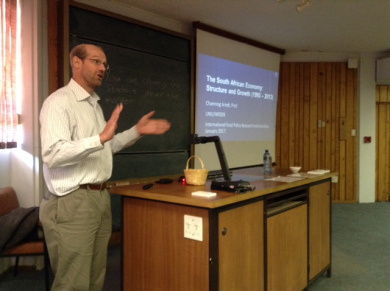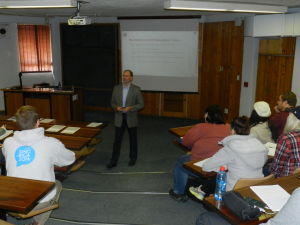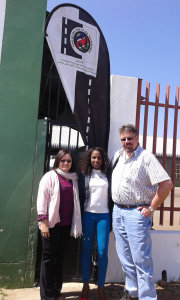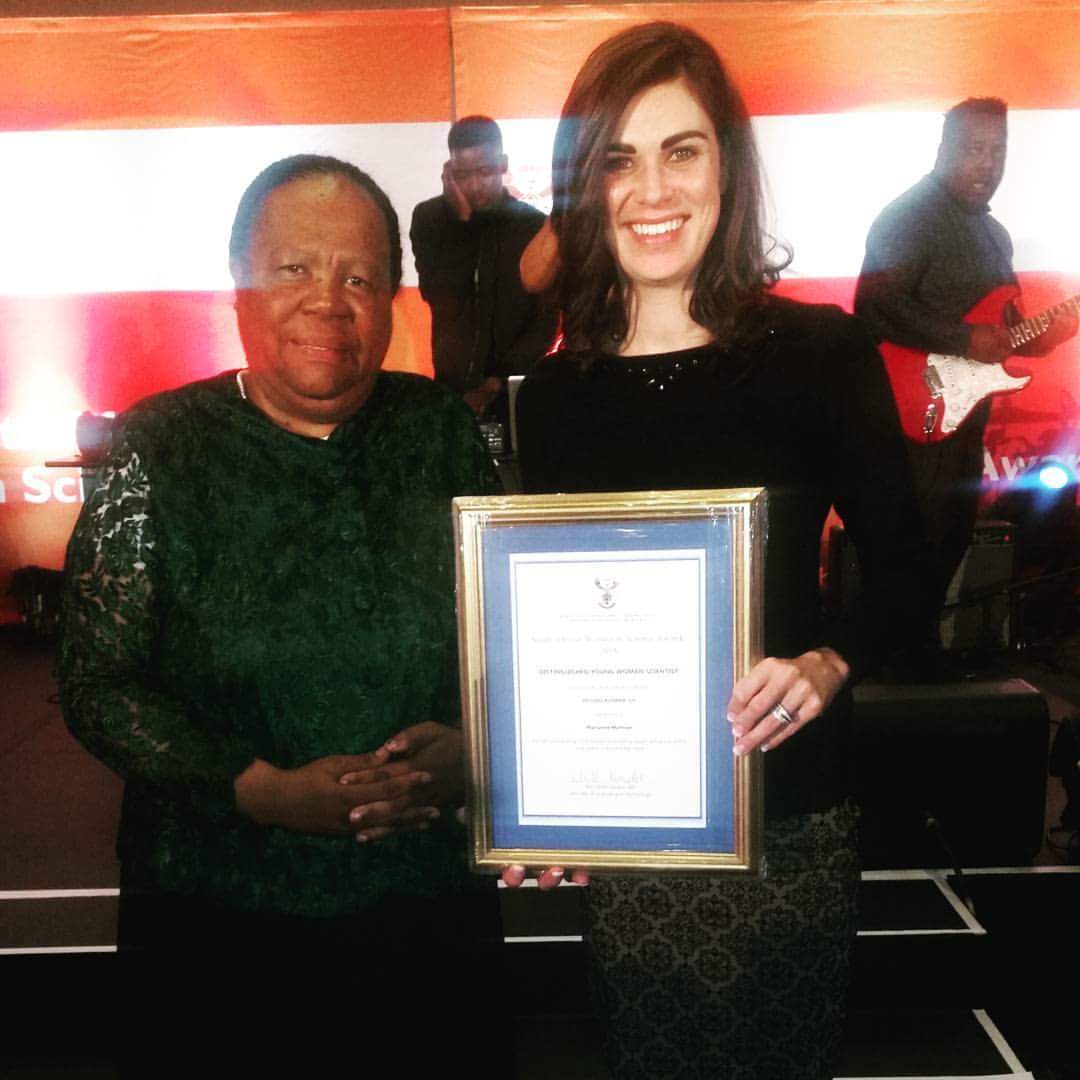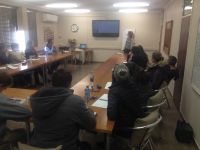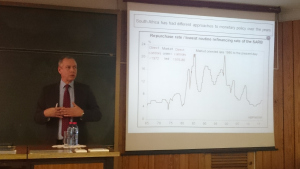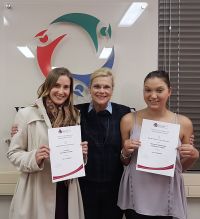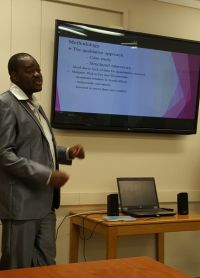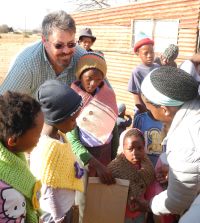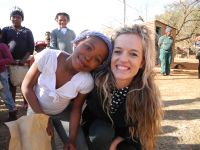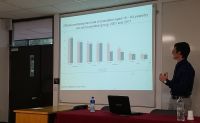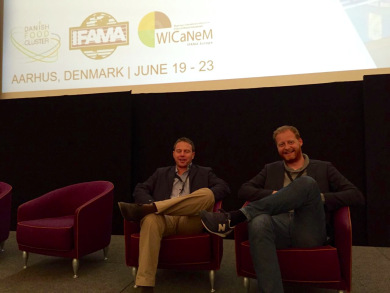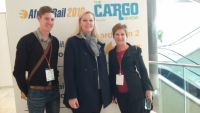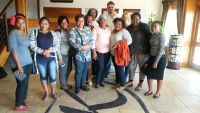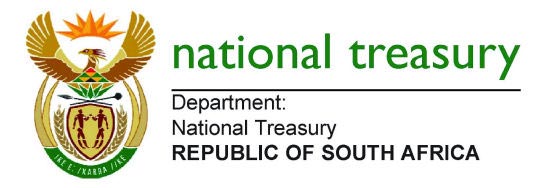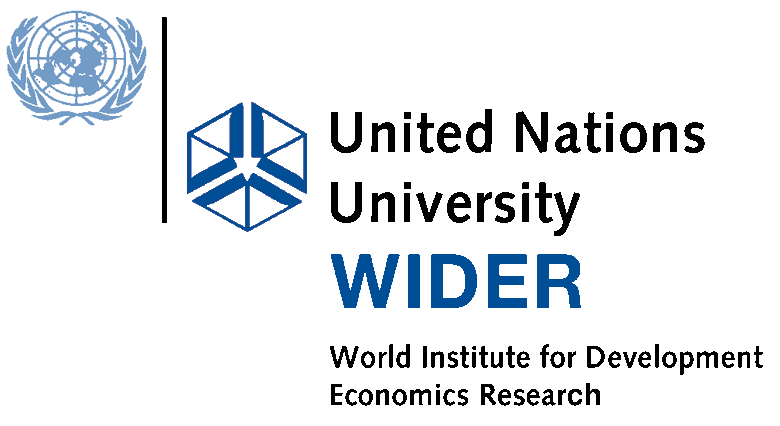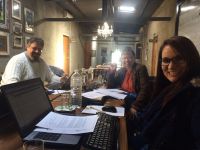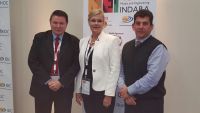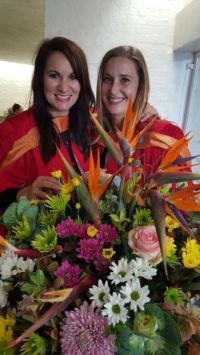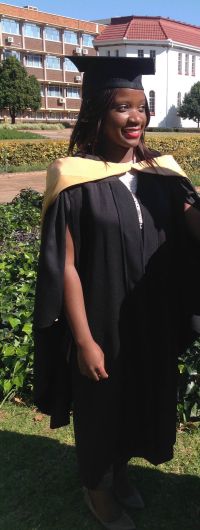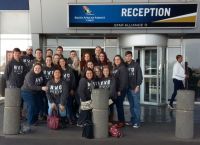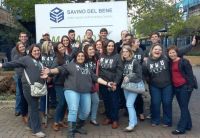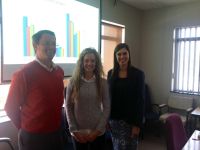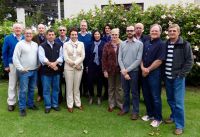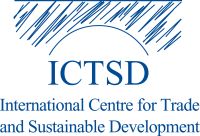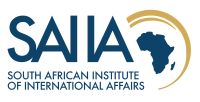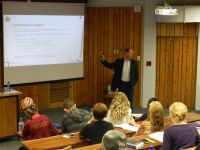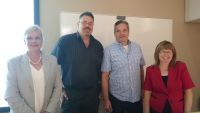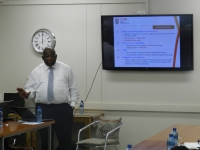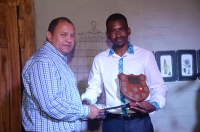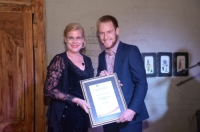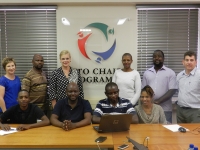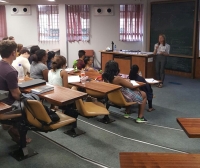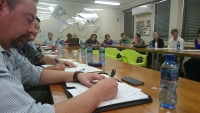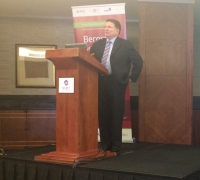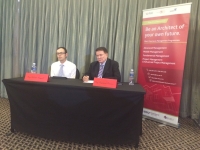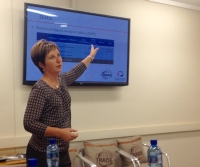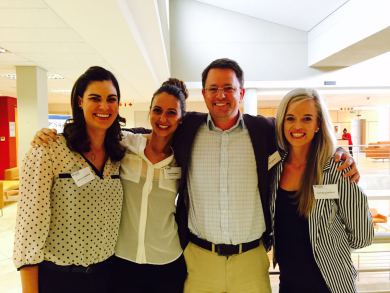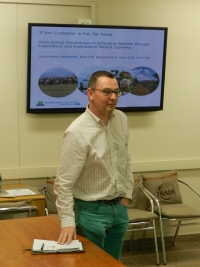
2016 events |
|
9 December 2016: TRADE attend SAIIA workshop on harnessing gender for inclusive trade On 9 December, Prof Wilma Viviers and Ms Ali Parry participated in a workshop in Johannesburg titled 'Harnessing Gender for Inclusive Trade', which was hosted by the South African Institute of International Affairs (SAIIA) and the University of Adelaide's Institute for International Trade (IIT). The workshop provided a platform for trade and gender experts from across Africa and representatives of international organisations, including the World Bank, to debate the gender gap phenomenon on the continent and how it impacts countries’ economic and trade performance. Informal cross-border trade (ICBT) was a key focus area at the workshop, with many delegates commenting on the risks inherent in this type of business – particularly for women. Also highlighted were the challenges associated with the textiles/clothing and agricultural sectors (both major employers of women in Africa). There was general consensus that economic, industrial, labour and trade policies in Africa need to be more gender-sensitive and should be accompanied by realistic and measurable action plans to improve their chances of being implemented. A summary of the workshop proceedings can be found here. |
Above: Ms Ali Parry with Ms Talitha Bertelsmann-Scott (SAIIA) Below: Ms Ali Parry also served on one of the panel discussions during the workshop |
|
30 November - 1 December 2016: Research findings shared at UNU-WIDER conference On 30 November, Prof Marianne Matthee and Ms Carli Bezuidenhout (along with Prof Neil Rankin from Stellenbosch University) presented their latest research on South African exporters at a conference in Pretoria organised by UNU-WIDER (United Nations University World Institute for Development Economics Research). The theme of the conference was ‘Growth and development policy: New data, new approaches, new evidence’. The research, which forms part of a three-year UNU-WIDER and National Treasury project, used SARS administrative data to examine different topics – ranging from the characteristics of exporters and two-way traders, through to productivity, innovation, the employment tax incentive and determinants of wages. Particular emphasis was given to the interrelationships between trade and productivity, and exporting and labour demand. |
Above: Ms Carli Bezuidenhout and Proffs Neil Rankin and Marianne Matthee |
|
25 November 2016: TRADE considers the latest UNCTAD Trade and Development Report
“In global economic terms, 2016 will be remembered as a year of living dangerously,” said UNCTAD’s Igor Paunovic in a webinar live-streamed from Geneva to the North-West University’s TRADE research entity on 25 November 2016. For more information, click here. |
Above: Members of the TRADE research entity listen attentively to Mr Igor Paunovic's summary of the 2016 UNCTAD Trade and Development report |
|
21-25 November 2016: Training in trade policy analysis for TRADE doctoral student Ms Lorainne Ferreira, a PhD student in TRADE, attended a highly informative course on trade policy analysis in Dakar, Senegal from 21-25 November 2016. The course, which was hosted by the African Institute for Economic Development and Planning and The African Trade Policy Centre, focused in particular on the practical application of Gravity and Computable General Equilibrium (CGE) models, using STATA and GAMS software packages. |
Above: All those in attendance at the training course in Dakar |
|
14 November 2016: New book launched at WTO Chairs Conference On Monday 14 November, during the WTO Chairs Programme (WCP) Annual Conference in Geneva, Switzerland, a new book was launched by the WTO titled Trade costs and inclusive growth: Case studies presented by WTO Chair holders. This authoritative book examines how the WTO’s Aid for Trade initiative can help to implement the Trade Facilitation Agreement (TFA), the potential impact of the TFA in various regions, and the importance of mainstreaming trade into national development strategies - among other topics. Drs Ermie Steenkamp and Sonja Grater and Prof Wilma Viviers contributed a chapter to the book, titled 'Streamlining South Africa’s export development efforts in sub-Saharan Africa: A Decision Support Model approach'. |
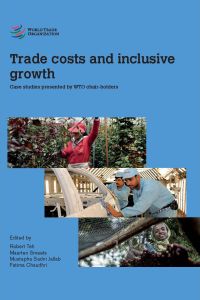 |
|
October and November 2016: Training in cross-cultural issues Prof Henri Bezuidenhout attended two training courses recently, on Cross-Cultural Intelligence and Cross-Cultural Competency. From 17-21 October, Prof Bezuidenhout underwent training at the Cultural Intelligence Center in Los Angeles in the United States and obtained an Advanced Certificate in Cultural Intelligence. He is now one of the few people in South Africa who may use 'CQ-Certified Advanced' in his title. Then, from 7-11 November, Prof Bezuidenhout attended a training programme on Cross-Cultural Competency at the world-renowned Richard Lewis Communications and Cross Culture Centre in Riversdown, England - the first South African to do so. |
Above: Prof Bezuidenhout (furthest right) with others at the Richard Lewis Communications and Cross Culture centre |
|
28 October 2016: NWU Excellence in Research Awards On Friday 28 October, at the NWU Excellence in Research Awards, Prof Wilma Viviers (holder of a WTO Chair) received the individual award for international recognition as well as a joint award for international success together with Prof Ludo Cuyvers (of the University of Antwerp) in recognition of their role in developing and rolling out the TRADE Decision Support Model (TRADE-DSM™). The NWU Excellence in Research Awards take place annually and are an opportunity for outstanding staff members to be acknowledged for their contribution to the university's research efforts. NWU Vice-Chancellor Prof Dan Kgwadi paid tribute to the NWU researchers who had delivered excellent outputs despite the challenges confronting higher education institutions over the past year. For more details, click here. |
Above: Prof Wilma Viviers with her individual award for international recognition |
|
21 October 2016: Agricultural Writers SA award for Dr Flippie Cloete On Friday 21 October, the Agricultural Writers SA award ceremony took place in Pretoria. These awards acknowledge the outstanding achievements of three commercial farmers, a new entrant in to commercial agriculture, and four agricultural personalities. *Prof Flippie Cloete was the recipient of the award 'Agriculturist of the Year' for North West. Specifically it was recognised that Prof Cloete has made his mark in South Africa’s game industry where he plays a vital role in helping industry role players make informed management and policy decisions. Prof Cloete administers a game database and coordinates the economic classification of the Southern Africa Wildlife Advocacy Group. He also wrote the game section of the ABSA Agri Outlook and is co-author of an ABSA publication about the profitability of the game industry in the country. He is a member of Game Industry South Africa’s Presidential Advice Committee and is subject group chair of agricultural economy at the North-West University (Potchefstroom Campus). More information about Agricultural Writers SA can be found here. *Prof Flippie Cloete has since left TRADE and now works at the University of the Free State. |
Above: Dr Flippie Cloete receiving his award for Agriculturist of the Year |
|
13-16 October 2016: Guest lecture by Dr Mihalis Chasomeris Dr Mihalis (Micky) Chasomeris from the University of KwaZulu-Natal (UKZN) visited TRADE from 17-19 October 2016. During his time at the North-West University, he gave a guest lecture to the International Trade Honours class on the topic: 'South Africa's Port Governance and Pricing: Dilemmas and Reforms'. His visit also included several discussions with current Master's students at TRADE, as well as talk with TRADE staff and students about possible future research collaboration. |
Above: Dr Chasomeris during his guest lecture to the International Trade Honours student class Below: Dr Chasomeris in discussion with TRADE staff |
|
13-16 October 2016: Prof Henri Bezuidenhout shares research findings on FDI in Africa Prof Henri Bezuidenhout attended the 82nd International Atlantic Economic Conference in Washington, D.C. in the United States from 13-16 October where he presented two papers: 'Determinants of cross-border mergers and acquisitions in the freight and logistics industry of South Africa: A qualitative approach' and 'Investigating the value chain dimension of FDI in and outflows of the agro-industrial sector of South Africa'. |
 |
|
13-14 October 2016: Prof Derick Blaauw attends research conference in Namibia From 13-14 October, Prof Derick Blaauw was in Windhoek in Namibia to deliver a paper at the 8th Annual Research Conference of the Faculty of Humanities and Social Sciences (FHSS) at the University of Namibia (UNAM). The theme of the conference was ‘Directing research towards Sustainable Development Goals (SDGs)’. Prof Blaauw’s paper, which he co-authored with colleagues from the University of the Western Cape and the University of Illinois in Chicago, was titled 'The socioeconomic incorporation of migrant and native-born day labourers in Tshwane, South Africa'. The paper was well received and the conference provided an ideal opportunity to establish new contacts and explore avenues for possible future research collaboration. |
Above: Prof Derick Blaauw with two colleagues from the University of Namibia Below: All those in attendence at the conference (click for large image) |
|
3-7 October 2016: Dr Alicia Fourie shares research findings on literacy levels in tertiary education Dr Alicia Fourie attended the Annual International Conference on Education in Las Vegas, United States from 3-5 October. She presented a paper titled: 'The Truth about Economic Literacy Levels of Undergraduate Students in South Africa', drawing on some of the findings in her PhD in Economics which had a similar topic. At the event Dr Fourie was honoured with an award for best presentation from the Clute institute. Following the conference, Alicia presented a poster on economic literacy levels in South Africa at the Renaissance Hotel in Phoenix, Arizona as part of the 55th Annual Financial Literacy and Economic Education Conference. |
Above: Dr Fourie received the award for best presentation by the Clute institute Below: Dr Fourie presented her poster on economic literacy levels in South Africa |
|
27-29 September 2016: NWU TRADE at WTO Public Forum Proffs Derick Blaauw and Sonja Grater, and Dr Anmar Pretorius accompanied the NWU’s WTO Chair holder, Prof Wilma Viviers, to the 16th WTO Public Forum in Geneva, Switzerland. The annual Public Forum is the WTO’s flagship event, according to their website, providing a unique platform for heads of state and leading global business people, academics and non-governmental organisations to come together and discuss major trade and development issues and concerns. Over 1,500 participants attend the Forum each year. The 2016 Forum focused specifically on how a broader spread of individuals and businesses have the potential to participate in the global trading system and how WTO rules can help to ensure that more people benefit from trade. For more details regarding the Public Forum, you can visit the WTO website or read a brief report regarding the visit (also one by Prof Derick Blaauw). Additional photos can be found here, and a video recording of Prof Viviers and Dr Grater's panel discussion was also made which can be seen here. |
Above: Dr Sonja Grater, Proffs Wilma Viviers and Derick Blaauw and Dr Anmar Pretorius at the 16th WTO Public Forum in Geneva |
|
On Thursday 22 September, the NWU's TRADE research entity, under the auspices of the WTO Chairs Programme, hosted a workshop together with the South African Institute of International Affairs (SAIIA) on the topic: 'Navigating global economic headwinds and tailwinds: New directions for industrial and trade policy'. Discussions centred on the new industrial and trade policy nexus, as well as the implications of Brexit for South Africa and countries in different parts of the world. A number of short presentations were also given by the speakers: Prof Peet Strydom - 'An overview of industrial policy and the new international trade environment', 'The role of firms in international trade' and 'New international trade patterns' Dr Sonja Grater - The role of small firms in R/GVCs Mr Martin Cameron - How a supportive policy framework/package can increase SADC's participation in R/GVCs Mr Peter Draper - Balanced regional trade agreements Prof Ludo Cuyvers - To Brexit or not to Brexit? That's the question More details regarding the workshop can be found by following the links below: 1) The paradigm shift in global trade relations — implications for South Africa’s industrial and trade policies (Summary of workshop) 3) Videos 4) Photos |
Above: All the speakers at the WTO-Chair (NWU) and SAIIA workshop together for a group photo |
|
13-16 September 2016: Fieldwork on day labourers in East London From 13 to 16 September 2016, Prof Derick Blaauw and Prof Rinie Schenck from the Department of Social Work at the University of the Western Cape (UWC) carried out fieldwork in East London as part of their joint NRF-funded research project on day labourers in South Africa. They were joined by six fieldworkers - all Social Work graduates from the Nelson Mandela Metropolitan University (NMMU), the University of Fort Hare and the University of the Western Cape. After an initial day of training, the fieldworkers began the practical survey. By the end of the period, more than 150 interviews had been conducted with day labourers across the city. |
Above: Proffs Derick Blaauw and Rinie Schenck together with field workers Below: Fieldworkers in action doing practical surveys |
|
7 September 2016: Meeting with NWPG On Wednesday 7 September, Proffs Wilma Viviers and Raymond Parsons met together with senior officials from the North West Provincial Government (NWPG). The meeting was focused on devising a possible strategy whereby the North-West University (NWU) can collaborate with the NWPG to aid economic development in the region, with a special focus on the role of business. Various key issues were discussed, such as setting up chambers of commerce and providing assistance to villages, townships and small towns. Furthermore, the aim was to create a document (or template) for economic transformation in the region by mobilising current larger chambers of commerce that can also assist smaller chambers of commerce. |
Above: Prof Wilma Viviers and Prof Raymond Parsons with senior officials from the NWPG |
|
5-9 September 2016: GTAP training by Prof Lucas Ferraz Prof Lucas Ferraz, from the Fundação Getulio Vargas and the São Paulo School of Economics in Brazil, visited the NWU from 5-9 September. Among his various engagements that week, he conducted a two-day introductory training workshop for School of Economics staff and PhD students on the use of GTAP research. GTAP, which stands for the Global Trade Analysis Project, involves using general equilibrium models to analyse trade issues. Prof Ferraz gave the group a taste of what the GTAP model can do and also showed an interesting simulation of the impact of a reduction in non-tariff barriers on trade between the EU-27 and Sub-Saharan African countries. Afterwards, Prof Ferraz spent some time with those PhD students who are examining trade facilitation from different perspectives. On 8 September, Lucas participated in the TRADE research entity's postgraduate colloquium and provided valuable inputs into the work of two postgraduate students, guiding them in how to incorporate GTAP into their research. During his visit to the university, Lucas also presented a paper ‘Trade Facilitation, Global Value Chains and Income Inequality’ at a seminar and held several discussions with Proffs Sonja Grater and Ermie Steenkamp on areas of possible research collaboration for 2017. |
Above: Prof Lucas Ferraz leading the GTAP training Below: Prof Lucas Ferraz together with some of the NWU staff and PhD students who attended the training |
|
1-2 September 2016: TRADE visits the University of Nottingham Ms Carli Bezuidenhout and Prof Marianne Matthee attended the Dynamics, Economic Growth and International Trade DEGIT XXI Conference at the University of Nottingham from 1-2 September 2016. They presented a paper on exporting and employment titled: 'The case of South African manufacturing firms’. Among the excellent line-up of speakers at the conference were David de la Croix, who delivered the keynote address on apprenticeships from an economic history perspective, and Gene Grossman, who presented the World Economy Annual Lecture. Ms Bezuidenhout and Prof Matthee had the opportunity to network with international experts in the international trade and labour fields, and to meet with Carol Newman, an Associate Professor at Trinity College in Dublin and a UNU-Wider research fellow, to discuss future research collaboration on firm-level data. A highlight of their trip to Dublin was visiting the famous library at Trinity College. |
Above: Associate professor Carol Newman, Prof Marianne Matthee and Ms Carli Bezuidenhout (left to right) |
|
26 August 2016: Guest lecture by Dr Channing Arndt On 26 August, Dr Channing Arndt of UNU-WIDER came to deliver a guest lecture as part of the School of Economics’ seminar series. He spoke on the topic of structural change in the South African economy and used mini Social Accounting Matrices constructed for the period 1993 to 2013 to examine changes in productivity. The results for the period in question revealed the all-too-familiar patterns of slow economic growth and a low rate of employment growth, with the situation being particularly acute since 2008. Dr Arndt’s lecture prompted some very interesting discussions on the export of services and the growth in the skilled wage premium. A short video review of his lecture can be found here. |
Above: Dr Channing Arndt giving his guest lecture on structural change in the South African economy |
|
19 August 2016: Guest lecture by Mr Peter Draper On 19 August, Mr Peter Draper from Tutwa Consulting gave a guest lecture to the ECON621 Honours class. Peter provided some very insightful comments on the current economic climate in South Africa, focusing in particular on movements in the balance of payments and what they mean for the country’s prospects in the short and longer term. |
Above: Mr Peter Draper giving his guest lecture on balance of payments |
|
13 August 2016: Men on the Side of the Road (MSR) On 13 August, Prof Derick Blaauw and Dr Anmar Pretorius met with Ms Crystal Beukes and colleagues from Men on the Side of the Road (MSR) in Windhoek, Namibia as part of an ongoing NRF-funded research project focusing on informally employed day labourers in South Africa. Namibia has an unemployment rate of around 36% and MSR is an initiative aimed at combatting this state of affairs. Established in 2007 by the Dutch Reformed Church Eros, MSR is a registered welfare and non-profit organisation based in Windhoek which aims to improve the skills of Namibian men and prepare them for the job market. Unemployed men are invited to register on MSR’s database which makes them eligible to take part in MSR’s training and placement programme. Among the training courses on offer are career guidance, English literacy, money management and entrepreneurship. Ultimately the aim of the initiative is to increase members’ prospects of being placed in permanent jobs. MSR has approximately 1 000 unemployed men on its database. Members have identity cards listing the skills they have. If a member of the public needs any unskilled or semi-skilled workers, they can contact MSR which will then endeavour to put them in touch with suitable workers. The initiative is supported by the private sector and MSR also liaises with the Ministry of Labour and the National Training Authority in Namibia. Prof Blaauw and Dr Pretorius have been invited back to Windhoek to continue their discussions with MSR and explore a range of collaboration models. For further information, follow MSR Namibia’s Facebook Page. |
Above: Prof Derick Blaauw with Ms Crystal Beukes from Men on the Side of the Road (MSR) |
|
On Saturday 13 August, the NWU hosted another Postgraduate Open Day for prospective Master's and PhD students. This was an ideal opportunity for potential applicants to acquaint themselves with all of the Master's and PhD programmes available at the NWU. More information can be found here. |
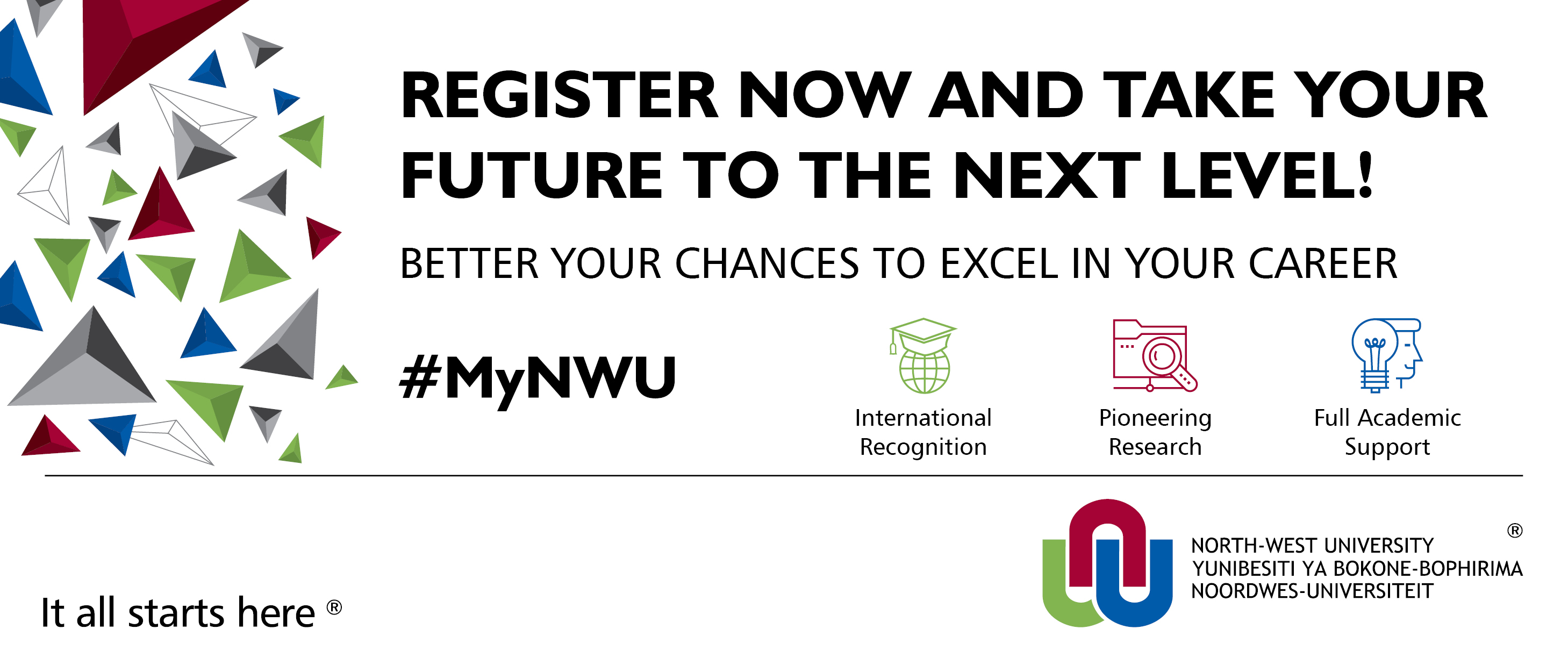 |
|
On 11 August, at the South African Women in Science Awards function held in Johannesburg, Prof Marianne Matthee was named Second Runner-up in the Distinguished Young Women Researcher category (Humanities and Social Sciences division). The South African Women in Science Awards, which are presented annually by the Department of Science and Technology, honour selected individuals who are making a significant contribution to the advancement of knowledge and innovation in various scientific fields, thereby acting as role models for other women professionals. We congratulate Prof Matthee (video) on her well-deserved achievement! *The NWU Staff Publication 'eish!' also recently (November 2016) carried an article on Prof Matthee's achievement at the SA Women in Science Awards. |
Above: Ms Naledi Pandor with Prof Marianne Matthee |
|
On 4 and 5 August, the annual Winter School of the School of Economics took place in E3-138. This Winter School forms part of the MCom in International Trade and Economics programme and all Master's level students are expected to attend. The focus of the Winter School was on the immediate context of the students' research, and a number of speakers came to give some broad insights. Prof Andrea Saayman gave an overview of the history of economic thought (you have to know if your approach is new or neo-classical). Dr Ed Kerby of LEAP at the University of Stellenbosch spoke about economic history research and seven major themes in the field: Micro analysis, Livings standards, Economic growth, Institutions, Monetary economics, Culture and Development economics. Prof Raymond Parsons spoke about South Africa's policies and political economy (particularly relevant now that the ANC's NEC has called for a re-planning of the NDP). And finally, Prof Andre Heymans gave an overview of research specifically in the Finance field. For more information about our Master's and PhD programmes, click here. |
Above: Prof Andrea Saayman giving an overview of the history of economic thought at the 2016 Winter School |
|
28 July 2016: Guest lecture by Dr Johan van der Heever On Thursday 28 July, Dr Johan van der Heever, head of the Reserve Bank's research and statistics department, visited TRADE to give a guest lecture on 'Monetary Policy and Issues in South Africa: The South African economy's reaction to extreme monetary policy settings'. |
Above: Dr Johan van der Heever |
|
21 July 2016: TRADE-WTO awards function Three separate WTO-sponsored awards were presented at the TRADE-WTO awards function held at the NWU: the best PhD thesis, the best WTO-related paper and the most promising Honours student at TRADE. These awards aim to recognise and encourage excellent scholarship and research on WTO-related themes. Dr Carike Claassen received the award for the best PhD thesis, titled: 'The state of decoupling before and during the Great Recession'. Ms Danielle Le Clus-Rossouw, Prof Wilma Viviers and Prof Elsabe Loots received the award for the best research paper, titled: 'Is there a link between BRIC foreign direct investment and SADC export performance?' Ms Roxanne Snyman received the award for the most promising Honours student in International Trade in 2016 following some excellent academic results during the first semester of the year. |
Above: Dr Carike Claassen, Prof Wilma Viviers and Ms Roxanne Snyman at the TRADE-WTO awards function |
|
21 July 2016: TRADE Colloquium #4 The fourth TRADE colloquium of 2016 took place from 10:00-12:00 on 21 July in E3-138. This was another opportunity for Master's and PhD students to present their research proposals and draft articles, and obtain feedback. |
Above: Mr Darlington Chizema giving his presentation on Foreign Direct Investment (FDI) outflows from South African retail firms to Sub-Saharan Africa |
|
18 July 2016: Mandela Day visit to Holdings Hands Mandela Day is a wonderful opportunity to give or do something to encourage and support another community in South Africa. On Monday 18 July, several members of the TRADE team visited the Holdings Hands community project at Rysmierbult to distribute gift packages to the children of the Holdings Hands seamstresses. TRADE team members had been knitting and preparing the gift packages for several weeks, and it was a great joy to see the children appreciate and enjoy their gifts. We hope that the seamstresses at Holding Hands will be able to secure more projects and that through such work the Rysmierbult community can continue to develop. |
Above: Prof Derick Blaauw and Ms Tume Molete distributing gift bags to the children Below: Ms Carli Bezuidenhout with the beanie-hat which she sewed for one of the Holding Hands children Below: All of the Holdings Hands children with their gifts |
|
27 June - 8 July 2016: LSE-UCT Winter School 2016 Ms Michelle Groenewald and Mr Caro Janse van Rensburg, both currently busy with their Master’s level studies in Economics at TRADE, took part in the winter school organised by the University of Cape Town (UCT) in association with the London School of Economics (LSE). The course they attended focused on poverty and development, and what researchers could be doing to enhance their knowledge of these two interrelated phenomena. During the course, interesting insights were exchanged on the causes of poverty and there was also much discussion on possible solutions to this enduring problem. The heterodox view of the LSE professors regarding the problem of poverty in Africa provided much food for thought. |
|
|
24-26 June 2016: IAFFE annual conference Dr Carike Claassen and Mr Caro Janse van Rensburg attended and presented a paper at the 25th annual conference of the International Association for Feminist Economics (IAFFE), which took place at the National University of Ireland (NUI) in Galway, Ireland. In their presentation they spoke about the individual characteristics that influence the probability of being employed in South Africa, a topic that drew much interest from other delegates. |
Above: Mr Caro Janse van Rensburg (TRADE Master’s student) presenting the joint paper at the IAFFE annual conference |
|
19-23 June 2016: IFAMA conference Drs Flippie Cloete and Ernst Idsardi delivered two conference papers at the International Food and Agribusiness Management Association’s (IFAMA) world congress in Aarhus, Denmark. The theme of the Congress was ‘Food Security 2050’ and the two papers presented were: ‘Trends and Determinants of Foreign Direct Investment in Africa’s Agro-food Sector’ by Dr Ernst Idsardi, Dr Flippie Cloete and Prof Henri Bezuidenhout. ‘Breaking the ‘big data’ barrier when selecting agricultural export markets: An innovative approach’ by Prof Wilma Viviers, Mr Martin Cameron and Mr Ezra Steenkamp (presented by Dr Ernst Idsardi). |
Above: Drs Flippie Cloete and Ernst Idsardi at the 2016 IFAMA conference |
|
28-29 June 2016: The Cargo Show Africa 2016 Dr Sonja Grater and Ms Lindie Stroebel were guest speakers at The Cargo Show Africa 2016 which took place in Sandton, Johannesburg. Dr Grater spoke on the topic: 'New trade routes and trade corridors in Africa', and Ms Stroebel led a workshop discussion on the topic: 'Dealing with time-critical cargo'. For more information regarding the Cargo Show, click here. |
Above: Mr Jacob van Rensburg (TRADE Master’s student), Ms Anita Schaap (TRADE PhD student) and Dr Sonja Grater at The Cargo Show Africa 2016 |
|
11-14 June 2016: Practical fieldwork in Port Elizabeth From 11 to 14 June, Prof Derick Blaauw joined Prof Rinie Schenck of the Department of Social Work at UWC (University of the Western Cape in Port Elizabeth for a few days of practical fieldwork as part of a joint research project on day labourers in South Africa. Proffs Blaauw and Schenck were assisted by 10 field workers, all of whom were Social Work graduates from NMMU (Nelson Mandela Metropolitan University), the University of Fort Hare and UWC. The first day was taken up training the field workers and the actual fieldwork commenced the following day. Over the three-day period, more than 100 interviews were conducted with day labourers across the city. The fieldworkers reported that many of the respondents were only managing to find work on one or two days a week, and were hungry. What became apparent was that real wages had decreased since the previous survey in 2007/08 and competition for available jobs had increased markedly as well. Migration - and the presence of foreign-born migrants in particular - is a reality, bringing heightened tension to the street corners. The research team encountered a Zimbabwean teacher at one of the hiring sites. This confirmed the dire situation in Zimbabwe and suggested that another wave of Zimbabwean migrants is or soon will be making its way to South Africa. Some respondents did not want to participate – a choice the researchers obviously respected. Once the fieldwork had been completed, there was a debriefing session in which all the fieldworkers expressed their concerns about the harsh socio-economic circumstances of these vulnerable people. While researchers can highlight day labourers’ plight, the biggest challenge going forward is how to offer some form of hope to those who are close to losing it or have already given up. Over the next few months, the project will see the research team extend their fieldwork to East London and Cape Town. |
Above: Proffs Derick Blaauw and Rini Schenck together with the 10 field workers assisting with the practical work |
|
7 June 2016: SARB/National Treasury/UNU-WIDER workshop On 7 June, Prof Marianne Matthee participated in and delivered a presentation at an SARB/National Treasury/UNU-WIDER workshop held at the South Africa Reserve Bank. The focus of the workshop was on the reasons why South Africa’s productivity is so low. In her presentation, Prof Matthee provided insight into the productivity levels of manufacturing exporters, highlighting the fact that very few firms are involved in exports. Other presentations included an overview of aggregate productivity by Dr Channing Arndt (UNU-WIDER), an investigation into productivity growth in South African and other emerging markets by Dr Carol Newman (UNU-WIDER and Trinity College), competition and productivity by Dr Nicola Viegi (University of Pretoria) and trade and intermediaries by Prof Lawrence Edwards (University of Cape Town). The keynote speaker at the workshop was Dr Paul Schreyer, Deputy Chief Statistician of the OECD. |
|
|
6 June 2016: Wits Business School public seminar Prof Marianne Matthee and Ms Carli Bezuidenhout from TRADE are part of a research group (including Prof Neil Rankin from Stellenbsoch University) who participated in a public seminar at the Wits Business School on 6 June. The purpose of the seminar, whose theme was 'A New Analytical Frontier: Firm Level Analysis Using SARS Administrative Record Data', was to showcase the latest research on the manufacturing export sector in South Africa, based on newly-released administrative record data. The whole initiative was the product a of collaborative effort between SARS, the Economic Policy Division of the National Treasury and the World Institute for Development Economics Research of the United Nations University (UNU-WIDER). |
 |
|
6-7 June 2016: Radio interviews On 6 and 7 June, Prof Derick Blaauw was interviewed on Power 98.7 FM and Radio Sonder Grense 100-104 FM, in connection with his latest research on wage trends among day labourers in South Africa. Business Day also shared news of his research, in which he has collaborated with Dr Anmar Pretorius, also from TRADE, and Prof Rinie Schenck from the University of the Western Cape. To listen to recordings of the radio interviews, click here. |
 |
|
1-3 June 2016: Academic article writing workshop In early June, Ms Ali Parry (director of Trade Matters (Pty) Ltd and an extraordinary research scientist in the TRADE research entity) was the facilitator at a workshop focusing on how to write high-impact academic articles that will appeal to esteemed journals. Attended by a number of researchers from TRADE, the workshop was hands-on, enabling participants to engage in practical exercises, such as selecting an interesting theme or ‘angle’, formulating arresting titles, ensuring strong beginnings and endings, writing concisely, applying the ‘golden thread’ technique, and using references wisely. The participants agreed that periodic get-togethers to exchange ideas about research topics, information sources and positioning tactics would be very beneficial. |
Above: Prof Derick Blaauw, Dr Anmar Pretorius and Dr Alicia Fourie at the Academic article writing workshop |
|
On 27 May, Proffs Wilma Viviers and Raymond Parsons attended the Southern Africa Metal and Engineering Indaba held at the Industrial Development Corporation (IDC) Conference Centre in Sandton, Johannesburg. The purpose of the indaba was to spark the revival of manufacturing in general, and the metal and engineering sector in particular, by providing business executives and captains of industry, policymakers, senior government officials and labour leaders with an opportunity to discuss matters of common interest in a robust but constructive manner. Engagements of this nature could help to stimulate the manufacturing sector, thereby boosting South Africa’s economic growth prospects. Prof Viviers, together with Mr Martin Cameron, delivered a presentation at the indaba on the topic: 'Fishing in a bigger pond: Opportunities for the Metals and Engineering sector in Southern Africa? - A Decision Support Model Approach'. More details regarding the conference can be found here. |
Above (from left): Proffs Raymond Parsons and Wilma Viviers with Mr Martin Cameron |
|
26 May 2016: Conferring of new PhDs On 26 May, the following individuals received their PhDs at a formal graduation ceremony: Dr Carike Claassen whose thesis was titled: ‘The state of decoupling before and during the Great Recession’. She was guided in her work by Prof Elsabé Loots (University of Pretoria), Prof Alain Kabundi (SARB) and Prof Wilma Viviers (TRADE). Dr Alicia Fourie whose thesis was titled: ‘A case study of determining the economic literacy of introductory economics students in South Africa’. She was guided in her work by Prof Waldo Krugell (NWU). In a separate graduation ceremony held at the University of Johannesburg on 22 March, Dr Anmar Pretorius also received her PhD for the thesis titled: 'An empirical analysis of South Africa's financial market integration with the world'. She was guided in her work by Prof Alain Kabundi (UJ). These individuals should be commended for their hard work and achievements. |
Above: Drs Alicia Fourie (left) and Carike Claassen. |
|
24 May 2016: MCom graduation ceremony On 24 May, the following individuals from TRADE obtained their Master’s degrees at a formal graduation ceremony: MCom Economics: Mr Hardus Louw whose dissertation was titled: ‘The relationship between the financial sector and economic growth in South Africa’ (Supervisors: Prof Derick Blaauw and Dr Anmar Pretorius). Ms Sandra Makumbirofa whose dissertation was titled: ‘Analysing and forecasting qualified labour demand in the South African hotel accommodation sector’ (Supervisor: Prof Andrea Saayman). Ms Maryke van Zyl whose dissertation was titled: ‘Energy-intensive clusters in the gold mining supply chain: Implications for energy policy’ (Supervisors: Drs Requier Wait and Riaan Rossouw). MCom International Trade: Mr Johan Malan whose dissertation was titled: ‘An analysis of export and employment opportunities for the South African manufacturing industry’ (Supervisors: Dr Ermie Steenkamp, Prof Wilma Viviers and Dr Riaan Rossouw). |
Above: Ms Sandra Makumbirofa after receiving her MCom degree |
|
24 May 2016: GEGAfrica dialogue on GVCs and SMEs On 24 May, Ms Ali Parry (an extraordinary research scientist in the TRADE research entity) attended a dialogue in Pretoria organised by the GEGAfrica group (Global Economic Governance) on the theme: ‘Global Value Chains and SMEs – what role for the G20?’. The main speaker at the event, Mr Peter Draper of Tutwa Consulting, spoke about the dynamics and policy implications of Global Value Chains (GVCs) and why SMEs find it difficult to supply competitively to large multinational corporations (MNCs) and participate in MNC-dominated GVCs. During the open discussion that followed Peter’s presentation, it was agreed that most South African SMEs lack the technical and entrepreneurial skills needed for GVC success, while also having to contend with periodic power outages and a difficult regulatory environment (especially in the face of limited financial resources and operational capacity). It was suggested that the G20 could be a useful platform for encouraging more SME-friendly policies in member countries, but that the latter’s varying economic and political agendas were likely to be an obstacle to South Africa extracting any meaningful concessions. |
|
|
19 May 2016: Guest lecture by Dr Sonja Grater On 19 May, Dr Sonja Grater delivered a guest lecture to the final year Engineering students at the NWU. In her lecture, she focused on some important introductory concepts pertaining to international trade, and specifically Incoterms, so that the students would have a better appreciation of trade processes and dynamics when they enter the business world. This lecture formed part of a new course for Engineering students on general business skills. |
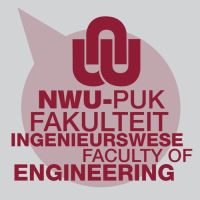 |
|
18 May 2016: International Trade Honours road trip On 18 May, the International Trade Honours students, together with Dr Sonja Grater and Prof Henri Bezuidenhout, went on their bi-annual road trip to Johannesburg. The trip formed part of the School of Economics’ curriculum development programme in which the students are given the opportunity to see, in practice, what they have learnt in class. The group first visited the SAA cargo facilities at O.R. Tambo International Airport and saw how the airfreight (export and import) operation worked. Of particular interest were the cargo handling facilities, and why it is so important to pack and mark cargo correctly. This was followed by a visit to the award-winning warehouse facilities of Savino Del Bene in Jet Park. Here students were able to see how a warehouse can be optimised for the receipt, distribution and storage of imported goods. |
Above: Students at the SAA cargo facilities Below: Students at Savino Del Bene's warehouse facilities |
|
17 May 2016: Holding Hands community project Prof Wilma Viviers, Dr Anmar Pretorius and Dr Carike Claassen from TRADE, together with representatives from the NWU’s AUTHeR (Africa Unit for Transdisciplinary Health Research) and other invited guests, visited the Holding Hands community project in Rysmierbult to see the seamstresses at work. The purpose of the visit was to encourage the various stakeholders to brainstorm ways to create longer term and more sustainable business opportunities for the community. A feedback session is being planned. |
|
|
16 May 2016: Stellenbosch University seminar On 16 May, Prof Marianne Matthee and Ms Carli Bezuidenhout, together with Stellenbosch University colleague Prof Neil Rankin, presented a paper on: 'Exporting, wages and wage inequality in South Africa' at a seminar hosted by the Stellenbosch University Department of Economics. |
Above: Prof Neil Rankin, Ms Carli Bezuidenhout and Prof Marianne Matthee |
|
12-13 May 2016: TRADE-DSM™ training for BITC On 12 and 13 May, staff from the Gaborone-based Botswana Investment and Trade Centre (BITC) visited TRADE for training in the use of the TRADE-DSM Navigator™. This forms part of the support package provided to the BITC in terms of the licence agreement it has entered into for the use of the TRADE-DSM™. |
Above: TRADE members and BITC staff at the TRADE-DSM™ training |
|
6 May 2016: 18th annual Ruiterbosch conference The 18th annual Ruiterbosch conference took place in Ruiterbosch in the Western Cape on 6 May, and was presided over by Prof Peet Strydom, a TRADE associate. Prof Wilma Viviers and Prof Waldo Krugell participated in the proceedings, along with other delegates from academia and the private sector. Topics included: developments in ICT and the international economy, the economic outlook for African economies and South African investments in Africa. |
Above: Attendees at the 18th annual Ruiterbosch conference |
|
4-5 May 2016: ICTSD/SAIIA services conference On 4 and 5 May, the Geneva-based International Centre for Trade and Sustainable Development (ICTSD) in cooperation with the South African Institute of International Affairs (SAIIA) hosted a conference in Johannesburg on the theme: 'Leveraging Services Potential for Inclusive and Sustainable Economic Growth'. Prof Wilma Viviers and Dr Sonja Grater, who are collaborating with the ICTSD on a number of research projects focusing on SMEs and sustainable development, represented TRADE at the conference, which attracted delegates from development organisations, regional governments, universities and private consultancies. Dr Grater also presented a paper on the topic: 'SMEs in a services world: an African LDC perspective’. All of the presentations were live streamed and a summary of the proceedings can be found here. |
|
|
The third TRADE colloquium of 2016 took place on 5 May at the premises of the TRADE research entity. This was another opportunity for Master’s and PhD students to present their research proposals and draft first articles, and to obtain feedback. |
|
|
21 April 2016: Guest lecture by Mr Peter Draper On 21 April, well-known trade expert Mr Peter Draper of Tutwa Consulting addressed students and staff at the NWU School of Economics on the current state of SA-US trade relations and what the future holds - particularly in the light of the fractious run-up to the renewal of AGOA earlier this year. He explained that to the United States, South Africa is a difficult trading partner, not helped by the fact that South Africa has been nurturing its trade and investment ties with China (a strategic competitor of the US) and the rest of BRICS. South Africa still receives most of its FDI (foreign direct investment) from the US, but South Africa’s changing legislative landscape (including the tightening of BBBEE regulations where investors are concerned) could see a spike in American companies departing our shores for greener pastures. It is likely that South Africa will be ‘graduated’ from AGOA when the facility expires in 2025, but previous unsuccessful attempts by South Africa and the United States to negotiate a free trade agreement do not auger well for South Africa having a ready replacement for AGOA. Consequently, the country could find itself at a severe competitive disadvantage vis-à-vis other developing economies, with negative repercussions for its export performance. |
Above: Mr Peter Draper giving his lecture on the current state of SA-US trade relations Below: Prof Wilma Viviers, Mr Peter Draper and Prof Henri Bezuidenhout |
|
13 April 2016: SABF working group discussions On 13 April, Dr Sonja Grater and Dr Ernst Idsardi of the TRADE team attended the Southern Africa Business Forum (SABF) working group discussions which were held in Johannesburg. A total of six working groups participated in the event, with Dr Grater focusing on trade facilitation and Dr Idsardi focusing on industrialisation and Regional Value Chains. The rationale for these working groups, which are convened once a year, is to provide an opportunity for the private and public sectors to come together to discuss and arrive at solutions to trade-related problems within the SADC region. More information can be found here. |
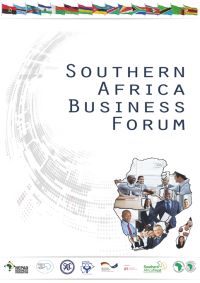 |
|
7 April 2016: TRADE Colloquium #2 The second TRADE colloquium of 2016 took place on 7 April at the premises of the TRADE research entity. This was another opportunity for Master’s and PhD students to present their research proposals and draft articles, and to obtain feedback. |
|
|
17 March 2016: Guest lecture by Prof Nik Theodore On 17 March, Prof Nik Theodore from the University of Illinois in Chicago, USA, visited TRADE and delivered a lecture at a ‘brown bag’ lunchtime seminar on: ‘Exploring frontier zones of the South African economy: Migration and day labour in Tshwane’. In his lecture, Prof Theodore gave a poignant account of the difficulties faced by day labourers (many of whom are migrants from other African countries) and how it is only through their own collective action that day labourers will ultimately be able to improve their economic circumstances. Prof Theodore forms part of a multi-disciplinary research team currently studying the day labour phenomenon in South Africa. In this regard, he is collaborating with TRADE team members Prof Derick Blaauw and Dr Anmar Pretorius and selected academics from other universities in a study examining food security and socio-economic conditions among waste pickers on landfill sites. |
Above: Prof Wilma Viviers, Prof Derick Blaauw, Prof Nik Theodore and Dr Anmar Pretorius |
|
15 March 2016: 3rd WTO-TRADE GVC roundtable At a roundtable convened by the TRADE research entity at the NWU, Dr Tebogo Makube from the Industrial Procurement Chief Directorate of the dti spoke about the government’s (re)industrialisation drive and the role of local manufacturing in strengthening South Africa’s capacity to produce value-added goods and gain easier access into Global and Regional Value Chains. Mr Martin Cameron, an associate of TRADE, built on Dr Makube’s presentation and examined the concept of local content and procurement from a renewable energy perspective. He looked at some of the challenges associated with formulating a clear local content policy for the power sector in South Africa, mainly because there are so many stakeholders with their own individual objectives and concerns. More details regarding the roundtable can be found here. |
Above: Dr Makube presenting at the WTO-TRADE GVC roundtable |
|
14 March 2016: TRADE-DSM Navigator™ training for the NWPG On 14 March, Mr Martin Cameron conducted a practical training session for five individuals from the North West Provincial Government’s Department of Finance, Economy and Enterprise Development (FEED) on the use of the TRADE-DSM Navigator™. |
Above: Mr Martin Cameron conducting TRADE-DSM Navigator™ training for individuals from the NWPG |
|
10-11 March 2016: CAPLP Writing School session #2 The NWU Centre for Academic and Professional Language Practice (CAPLP) held a follow-up Writing School session for Master’s and PhD students on 10 and 11 March 2016. For more details about the Writing School, contact trade@nwu.ac.za. |
|
4 March 2016: Faculty of Economic and Management Sciences' Academic Prestige functionThree awards were presented to TRADE students at the Faculty of Economic and Management Sciences’ Academic Prestige function which was held on 4 March at the Makojalo venue just outside Potchefstroom. Ms Lorainne Ferreira and Mr Joubert de Villiers received joint awards for the best MCom dissertation in the School of Economics, titled: ‘South Africa's economic policies on unemployment: A historical analysis of twenty years of transition’ and ‘The relationship between exchange rate volatility and portfolio inflow in South Africa’ respectively. Mr Johan Malan received the World Trade Organization prize for the best Master's degree dissertation, titled: 'An analysis of export and employment opportunities for the South African manufacturing industry'. Mr Gabriel Mhonyera received the award for the best Honours student in International Trade. All the award winners should be commended for their hard work and achievements. |
Above: Mr Gabriel Mhonyera receives his award Below: Mr Johan Malan receives his award |
4 March 2016: Guest lecture by Mr Philip WylieOn 4 March, Mr Philip Wylie, a freight and logistics specialist and consultant, delivered a guest lecture to the Economics Honours class. Philip focused on the state of infrastructure in southern Africa and, using specific country examples, highlighted the crucial role that infrastructure plays in a region's overall competitiveness. He also discussed progress with respect to trade facilitation initiatives in southern Africa. |
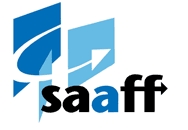 |
29 February 2016: Guest lecture by Dr Gustav BrinkOn 29 February, Dr Gustav Brink, an expert on WTO dispute resolution from XA Consultants, delivered a guest lecture as part of the ECON 616 International Trade Theory and Policy course. In his lecture he focused on trade remedies and the dispute settlement process at the WTO. The presentation slides are available here. |
|
26 February 2016: TRADE-DSM Navigator™ training for the dtiOn 26 February, seven people from the dti (Department of Trade and Industry) visited the TRADE research entity on the Potchefstroom Campus to undergo their second tier of training on the TRADE-DSM™ methodology and the TRADE-DSM Navigator™. The dti group were given the opportunity to share and receive answers to some of their typical work-/export-related questions under the guidance of Mr Martin Cameron, who conducted the training. Some of these questions were resolved by the participants themselves during the practical demonstration of the TRADE-DSM Navigator™ tool. Dr Sonja Grater also spoke to the group about her research on the export of services. The dti participants proposed that a similar DSM training and discussion session, but with the focus on trade in services, be held at the dti in the near future. Prof Wilma Viviers facilitated the day's training session and highlighted a range of possible research topics that emanated from the group discussions and interactions. |
Above: All those in attendance at the dti TRADE-DSM™ training session |
24 February 2016: Guest lecture on academic writingOn 24 February, Ms Ali Parry (director of Trade Matters (Pty) Ltd and an extraordinary research scientist in the TRADE research entity) spoke to the School of Economics' Honours students on the theme: 'Writing - where science meets art'. Ali offered insights into the changing character of writing across different communication platforms. She also explored the question of whether the trend these days towards shorter and simpler writing is compatible with the university's expectation that postgraduate students deliver thorough and academically-rigorous essays, dissertations and theses. In closing, Ali shared a checklist of writings tips designed to help students prepare for and compile their upcoming assignments and projects. The presentation to the Honours group formed part of the 'curriculum development' component of the WTO Chairs Programme at the university, which aims to build students' knowledge and practical skills in the international trade and development arenas. For more information about the WTO Chairs Programme at the university, click here. |
Above: Ms Ali Parry speaking to the 2016 Honours class |
|
18-19 February 2016: CAPLP Writing School session #1 The NWU Centre for Academic and Professional Language Practice (CAPLP) held its first Writing School session of the year for Master’s and PhD students. A follow-up session is scheduled for 10 and 11 March 2016. For more details about the Writing School, contact trade@nwu.ac.za. |
Above: Attendees at the CAPLP writing school |
4 February 2016: TRADE Colloquium #1On 4 February, a mini-colloquium was convened by the TRADE research entity and the NWU School of Economics. The colloquium provided an opportunity for new Master’s and PhD students to present their respective research proposals, proposed methodologies and available data to their supervisors and promoters. |
Above: Attendees at the mini-colloquium #1 |
2 February 2016: NWU launches Policy Uncertainty Index (PUI)The need for a more certain and responsive policy environment, which is capable of addressing critical economic challenges, is a common refrain in South Africa today. While policy certainty is not a panacea for all of society's problems, it gives businesses and consumers more confidence to act, and this plays out in a more vibrant and productive economy. Policy uncertainty, on the other hand, leads to general confusion and hesitancy, and may even prompt economic inertia. In a first for South Africa, the North-West University School of Business and Governance (NWU-SBG) and School of Economics have launched their 'Policy Uncertainty Index (PUI)', a quantitative model designed to give stronger definition to the concept of policy uncertainty in this country and to measure policy uncertainty over time. The result of extensive research into other countries' models and tailored to South Africa's particular circumstances, the NWU Policy Uncertainty Index (PUI) reveals the collective sentiment, via an aggregated input score, about the health (or otherwise) of the policy environment in the country, while also putting the spotlight on what is evidently working and what is not. More information can be found here. |
Above: Prof Raymond Parsons speaking at the launch of the PUI
Below: Prof Raymond Parsons and Prof Waldo Krugell taking questions at the launch of the PUI
|
25 January 2016: GVC analysis roundtableGlobal Value Chain (GVC) analysis is a complex matter and can involve various levels of firm-level and sector-level empirical research. This was the focus of a roundtable hosted by the TRADE research entity on 25 January at the NWU Potchefstroom Campus. The main presenter, Dr Sonja Grater, gave a broad overview of the different empirical methods that can be used to analyse GVCs and also discussed the various databases that exist, such as the OECD-WTO TIVA Database, the World Input Output Database (WIOD) and the Eora MRIO Database. The roundtable participants were drawn from the North-West University and organisations such as SAIIA, the dti and the North West Provincial Government. In addition to being highly informative, the gathering provided scope for further collaboration between the participants. For example, the next workshop will focus specifically on local content requirements and the impact of these on South Africa's ability to participate in GVCs – an area of interest to researchers and government entities alike. |
Above: Dr Sonja Grater leading the roundtable discussions
|
22 January 2016: ERSA workshopOn 22 January, Prof Derick Blaauw and Dr Carike Claassen attended an ERSA (Economic Research Southern Africa) workshop in Cape Town, the title of which was: ‘What church records can tell us about economic development’. During the colonial era, there was a dearth of reliable information about the living conditions and economic circumstances of African people. However, Dr Felix Meier zu Selhausen from the University of Southern Denmark, who gave the keynote speech, explained that church records have often proven to be a rich source of information and have helped to inform studies on social mobility and related issues. The workshop prompted fruitful discussions among the participants and Prof Blaauw and Ms Claassen plan to incorporate this new research angle into their work. |
|
21 January 2016: TIPS Development DialogueOn 21 January, a number of TRADE members attended a Development Dialogue arranged by TIPS (Trade and Industrial Policy Strategies) on the topic of Global and Regional Value Chains and how these are creating both opportunities and challenges for South African and regional policymakers and businesses. There was an impressive line-up of speakers: Mr Tom Farole (lead Economist at the World Bank), Prof Faizel Ismail (professor at the UCT School of Economics) and Prof Ben Turok (former ANC MP). They spoke about the economic advantages of GVCs and RVCs but indicated that South Africa has complex socio-economic circumstances that need to be properly addressed before a GVC/RVC philosophy can be embraced. Multinational activity in Africa has sometimes led to the suppression of domestic industries, but foreign capital is essential for a country’s development. Clearly, South Africa needs to strike the right balance between its own domestic interests and those of its regional and foreign trading partners if it is to take advantage of the GVC/RVC phenomenon. |
|
21 January 2016: Research results on firm-level export activity publishedOn 21 January at a function in Pretoria, Prof Marianne Matthee and Ms Carli Bezuidenhout from the TRADE research entity presented the first round of results from a far-reaching study in which they are involved, together with UNU-Wider, the National Treasury and SARS. With their research partners from the University of Stellenbosch, Prof Neil Rankin and Ms Tasha Naughtin, Prof Matthee and Ms Bezuidenhout used administrative data to examine the extent of export activity and productivity at firm level in South Africa. Their initial findings showed that South Africa's exports are driven predominantly by large, multi-country and multi-product companies, with small businesses playing a relatively minor role. |
Above (from left): Prof Marianne Matthee, Ms Tasha Naughtin, Prof Neil Rankin and Ms Carli Bezuidenhout at the presentation in Pretoria
|
19 January 2016: Guest lecture by Dr Paul IngenbleekOn 19 January, Dr Paul Ingenbleek of the Wangeningn University in the Netherlands visited the NWU School of Economics and the TRADE research entity. Dr Ingenbleek is involved in various research projects in Africa, focusing in particular on the role of strategic marketing in sustainable development for emerging markets. During his visit to the university, Dr Ingenbleek presented a lecture on some of his research findings regarding shrimp farmers in Benin, titled: 'Overcoming remoteness in emerging markets through exploratory and exploitative market learning'. He also held discussions with members of the TRADE team and School of Economics on possible collaboration in curriculum development and research. |
Above: Dr Paul Ingenbleek |

